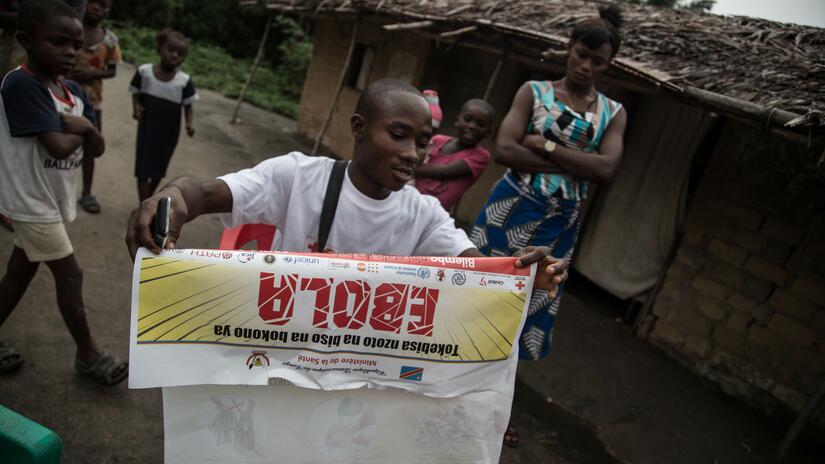In many Ebola-affected areas, years of conflict has eroded basic services and created mistrust in the community. Many communities feel that the response is not addressing their broader humanitarian needs. On some occasions, this mistrust has led to confrontations. DRC Red Cross teams have faced incidents of violence and aggression from communities resisting safe and dignified burial protocols since the start of the Ebola outbreak in North Kivu.
It is clear that some vulnerable communities do not trust Ebola responders, which stops them from accessing health care. There may be many more potential cases in communities that we are unaware of, who are not accessing lifesaving care and may be further transmitting the virus within their communities.
Communities hold the key to responding to the Ebola outbreak.
Without communities, Ebola cannot be eliminated. We need to listen to community concerns and fears, plan together with them and adapt our response in order to create trust and acceptance by humanitarian actors.
Red Cross volunteers are playing a vital role in maintaining a strong dialogue with communities, ensuring questions, misbelieves and rumours are discussed and addressed regularly. In partnership with the US Centre of Disease Control, Red Cross volunteers are collecting rumours, suspicions and concerns into a first-of-its-kind feedback and tracking system that has coded over 394,000 feedback points. This is shared with the rest of the humanitarian community to help address fears and misinformation as well as adapt and change operational approaches, based on the needs of the community.
Working with Ebola survivors to help tackle myths and rumours
To help tackle the fear and mistrust associated with Ebola, Red Cross is also working with survivors. People like 25-year-old carpenter, Machozi, has an incredible story to tell — and an important message for his community.
But he is now living proof that you can also survive. Machozi is one of many in the response efforts. Every day, volunteers are knocking on doors in the community, providing information on how to prevent, detect and respond to Ebola. They are hosting radio talk shows, setting up mobile cinemas and going house-to-house, sensitizing vulnerable communities, including people with disabilities, children and women’s groups.
“We have to unite and work together to fight against Ebola,” he says.
“Take me as living testimony. It is possible to save the community and survive Ebola if everyone, our young people above all, engage in sensitizing our communities to the idea that Ebola is not a considered a punishment or an invented disease. If everyone is involved, we can end this disease.”
Engaging communities pays off
We are seeing huge success when we address core community concerns. The success rate of Red Cross safe and dignified burials has remained consistently high at 80 per cent, while negative feedback has dropped over time as a result of quality community engagement work and changes in the Red Cross approaches based on feedback data. In addition, as a result of our community engagement, community resistance for safe and dignified burials have drastically declined from 79 per cent in the first two months of the operation to 8 per cent now.
--
Special thanks to our generous donors: American Red Cross, Austrian Red Cross, Belgian Red Cross, British Red Cross, China Red Cross, Danish Red Cross, Finnish Red Cross, Icelandic Red Cross, Japanese Red Cross, Kuwait Red Crescent, Norwegian Red Cross, Monaco Red Cross, Spanish Red Cross, Swiss Red Cross, Canadian Red Cross, Netherlands Red Cross, Turkish Red Crescent, Government of Austria, Government of United Kingdom (DFID), European Commission (DG ECHO), Italian Government Bilateral Emergency Fund, Government of Norway, Paul G Allen Family Foundation, Government of Spain, Government of Switzerland, Government of Canada, The Dutch Government, USAID, Western Union Foundation and WHO.

